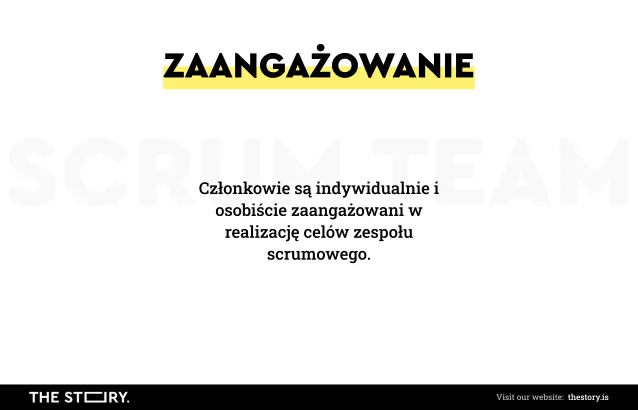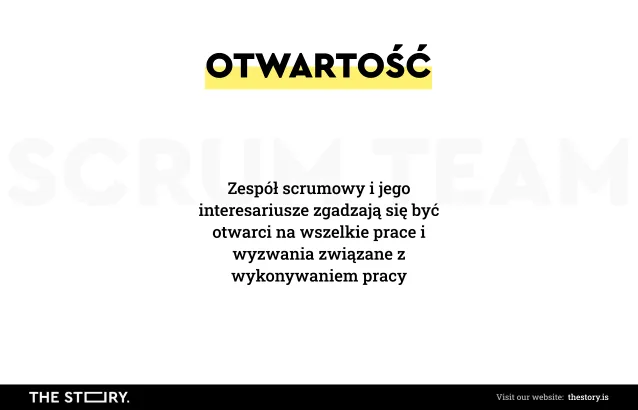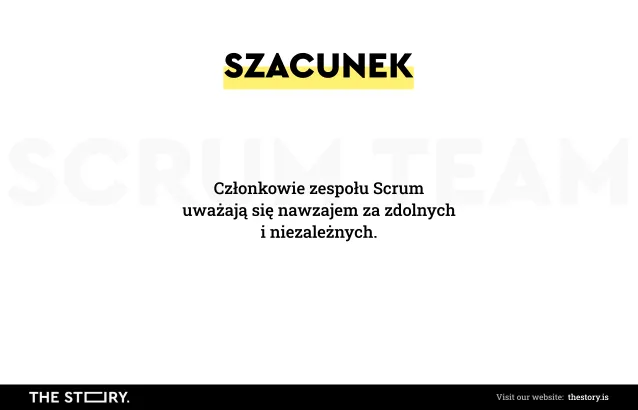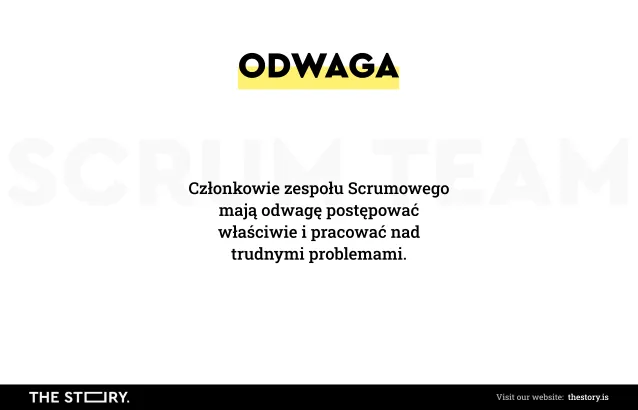According to the data presented in the article "Adopting Agile: The Latest Reports About The Popular Mindset," Scrum is one of the most frequently chosen methods for project management.
Teams choose Scrum because they're guided by the convenience and ability to divide work into smaller tasks (Sprints) that are expressed through User Stories.
Such widespread adoption of Scrum will become even more evident when we look closer at its benefits.
As well as values it's founded on and which it promotes and develops in employees — programmers (front end, back end), testers, and designers.
Scrum, above else, allows us to structure complex and multi-dimensional projects and give them clear goals — both short- and long-term.
It provides consistent work progress and helps control and manage it much more conveniently and effectively.
Moreover, Scrum is a framework characterized by high adaptability — it's possible to use it in various projects, companies, diverse work cultures, and project organization methods.
It is said that Scrum reinforces employees' sense of responsibility, allowing them to develop, learn, improve, and correct their actions.
It's a significant Scrum value but, of course, not the only one behind Scrum.
Scrum was built on five values that enable individuals and organizations to act and develop.
What values are the basis of Scrum? How can Scrum help development and design teams achieve their full potential and develop their capabilities?
How does one of the most popular Agile frameworks influence productivity, and does it really support innovation and capabilities?
Why are Scrum values so important, and why, out of the long list of values you can use in the professional domain, are these so vital in management?
This time we'll discuss Scrum from the side of values because values add the necessary meaning and weight to actions, goals, standards, and events.
As always, we cordially invite you to read our article!
Why is it worth using the Scrum framework?
Before explaining how team members can use it, we'll briefly discuss the Scrum methodology. You can read about it in more detail in the Scrum Guide.
Scrum is a framework, a structure, and frames that enable you to organize work, manage projects and solve problems productively and creatively.
Scrum allows you to obtain the expected quality of a digital product and offer values desired by various stakeholders, from end users to business owners.
While announcing the core of this article, we'll state clearly that values in Scrum are primarily used as a signpost that helps improve, enhance, and harmonize the cooperation of specialists within the Scrum team and increase the probability of project success.
Naturally, Scrum has much more advantages and offers much more benefits. Notably, the popular Agile framework completely changes the work process, convictions about work, and work management.
Unlike the waterfall methodology, which emphasizes the linear progress from the start to the end of a project, agile methods offer much more flexibility and adaptability to quickly changing expectations, requirements, and contexts.
They're much more adequate and beneficial when creating a digital product. They more accurately address the needs which are characteristic of the process of developing products such as mobile or web applications.
The agile methodology, instead of rigidity, offers flexibility. It's also more focused on a team, collective approach to developing a digital product.
It allows you to obtain much higher productivity. In the place of rules and schedules, it introduces Sprints whose nature we described in a separate article, "What is Sprint?."
The control over the course of the work, the development of a product, and the course of the project is much more effective thanks to the use of feedback loops — regularly obtained feedback.
Frequent reviews make the reactions quicker and protect against errors and their long-term consequences.
Scrum also enables you to continuously confront work results with stakeholders' expectations and make necessary corrections and thus deliver a product that the customer will like.
It's focused on the self-improvement of individual specialists and teams and also promotes sharing knowledge.
Sprints are used to implement a given User Story and are a chance to learn and share knowledge, information, and experiences.
As a side note, you can read more about User Stories in two of our articles, "User Story acceptance criteria" and "User Story."
Agile methodologies, including Scrum, are based on cooperation and self-organization, self-improvement, progress, processual understanding of work, and competencies.
Scrum is also famous for reducing the probability of making mistakes. Naturally, it doesn't reduce it to zero. You can't be under any illusions in this regard; it's not an ideal cure-all.
It also allows you to make more accurate and less risky decisions whose consequences have less weight.
The cumulative effect of all these characteristics translates into better budget use, greater cost-effectiveness, and work efficiency.
The Scrum values, which we will write about in more detail shortly, serve as a kind of signpost. They determine the direction of individual people and the entire Scrum and development team.
Last but not least, Scrum is appreciated for its effectiveness. That's what made it popular. However, Scrum wouldn't have a chance of succeeding if it wasn't based on solid fundaments — values.
This framework not only answers the question: "How to do it?" but also offers an answer to the question: "Why is it necessary to do something?".
It provides convincing justifications which every employee simply needs and expects. Technocratic procedures are seen simultaneously as effective and alien without being grounded in values.
Scrum counteracts this effect with clear and reasonable values.
It also obligates Scrum team members to follow them because only such an approach can guarantee the success of a project.
Okay, it's time to discuss the Scrum values, without which the framework wouldn't be as effective.
5 Scrum Values
Authors of "The 2020 Scrum Guide" very strongly emphasize that Scrum values give priority and direction to the Scrum team, especially regarding the scope of the work, actions, and behaviors.
They also stress that all decisions made in individual Sprints and all actions made during a project should reinforce the five values of Scrum.
They can't contradict them, downplay them, or undermine their validity and usefulness.
It is also worth emphasizing that Scrum values are not just abstract ideals that Scrum team members know about, but actively in their daily work make them a reality.
As the authors of the abovecited Scrum Guide write, the Scrum team is committed to achieving its goals and supporting each other.
So, what values do we have in mind when writing about Scrum values?
The five core Scrum values include the following:
- Commitment
- Focus
- Openness
- Respect
- Courage.
The Scrum Guide sets very specific roles and goals for Scrum values. Above all, the effective use of Scrum depends on whether the employees are willing to follow the five values mentioned above.
In other words, there is no use in applying Scrum if the organization isn't ready to follow, realize, promote, and appreciate the role of commitment, focus, openness, respect, and courage.
Finally, before we discuss individual values, we'll add that the Scrum framework was created to improve the process of managing projects with a high level of complexity.
The overriding idea was to deliver a tool to teams that would allow them to quickly, effectively, cheaply, safely, conveniently, and easily adapt to dynamic changes in requirements.
When writing about requirements, we think about goals and specific expectations formulated regarding a given project.
Scrum values — as long as they're shared, accepted, and appreciated by the Scrum team — decide the success of a given project or digital product.
Scrum Values — Commitment
According to a popular definition, an employee who is committed to their work is an employee who is entirely focused on it and has a positive or even enthusiastic attitude.

This is an employee who goes beyond the scope of the expectations formulated for them and who exceeds the goals set before them. In other words, a committed employee is an employee who is dedicated to work and engrossed in it.
Commitment is something more than just conscientious performance of responsibilities. The Scrum framework promotes an appropriate attitude toward the work and strongly supports the dedication to goals that the Scrum team developed. The Scrum team commits to supporting and helping each other in order to fulfill the set goals.
The success or failure of the project largely depends on how individual team members and the entire scrum team stay committed.
Working on a common goal requires continuous self-improvement and optimization of efforts put into the work.
With a proper attitude — commitment— achieving a goal much more efficiently is possible.
In Scrum, the crucial aspect of commitment is reflection and awareness of having a common goal.
In practice, this means that it's necessary to prioritize tasks correctly.
The quality of communication within the team and optimal planning of work increases commitment because, on the one hand, it creates a good atmosphere and, on the other, provides meaning, justification, and predictability.
Commitment means for every team member a sense of responsibility for the entire project and not only for the narrowly defined scope of individual work.
It exceeds the ambition to meet the deadline and directs efforts toward learning and increasing loyalty and productivity.
And that also means commitment and goodwill shown toward problems — in particular, it means a willingness to make efforts to solve them.
Metaphorically speaking, commitment means thinking in a category of "one for all, all for one."
Only joint actions, a sense of a shared goal, common means, and shared responsibility allows teams to deliver a project.
The commitment of all team members also increases mutual trust and supports a good atmosphere within the team.
Finally, commitment in Scrum also means devotion to a goal or vision of a product. Commitment also allows you to bring out the best in the team and its members.
So it's also a way of development, positive change, and beneficial reevaluation. Undoubtedly, it is also a source of satisfaction that stems from individual and group success.
Scrum Values — Focus
The essence of Scrum is Sprint. The division of work into smaller tasks allows Scrum teams to focus on a smaller scope and dedicate their full attention to it.
Creating the expected Increment requires focus, and as we know, human attention is limited, and too many elements don't support the intensity of focus, accuracy, and efficiency.
Splitting tasks into Sprints can be treated as an activity that aims to reduce the number of potential distractors — elements, stimuli, contexts, situations, and tasks that distract and reduce focus.

Focus means not only paying special attention to goals and means leading to them but also to the problems of other team members.
Cooperation reduces the risk of distraction and diminished focus.
Effective focus is also fostered by proper planning of Sprints in terms of time, scope of work, and the selection of a Sprint goal or goals. Both unrealistically broad and narrow scopes of work cause demotivation, decrease commitment and reduce focus.
The amount of planned work — User Stories to be implemented — should be optimal. The essence of agile methodologies is not an exploitative approach to employees.
Agile and the Scrum framework are about planning work that can be done with enthusiasm, a sense that there is enough of it that there is no time for distractions and little enough that it doesn't cause exhaustion or stress.
The amount of workload should stem from the reliably, fairly, and objectively determined capabilities of a given employee.
Scrum Masters should delegate only the amount of tasks that are possible to achieve without incurring negative costs.
Overworked developers, UX/UI designers, and UX researchers cannot focus effectively.
That's why an important role of a Scrum Master is to listen to the needs and pains of every team member.
Scrum Values — Openness
Openness in the Scrum framework means taking care of the quality of communication.
Openness means that all parties involved reliably, honestly, and with goodwill provide information to each other.
Transparency of the situation and the relationship determines the quality of the atmosphere in the team. It's a source of the necessary trust.
When thinking about Scrum values and openness, you also need to consider being open to changes.
In particular to changes involving the scope and character of expectations, market changes, and changes in business goals and technology.
Scrum promotes flexibility, and that isn't possible without openness. That's why Scrum team members must be sufficiently open to accept changes at various stages of a project.
Openness — and it's defined very broadly in agile methodologies — must also mean openness to new ideas, perspectives, and ideals.
Team members can't stay in their own domains; they should be open to expanding their knowledge and competencies.
Scrum values determine the work's effectiveness, which means that it is also necessary to openly talk about errors, mistakes, conflicts, misunderstandings, problems, and blockers. Daily Stand-ups are a perfect occasion for that.

Openness is fostered by honesty, impartiality, fairness, and transparency. That's why Scrum Masters must respond to team members' problems with great sensitivity.
Scrum Values — Respect
Mutual respect, especially respect shown to opposing opinions, assessments, diagnoses, ideas, goals, and solutions, is essential for the smooth, conflict-free, and effective operation of the team.
The Scrum Guide describes this value in the following way: "Scrum Team members respect each other to be capable, independent people."
It's worth remembering that while respect is crucial to the team's functioning, it's simultaneously beneficial because it increases the sense of belonging, fosters a sense of groupthink, and allows group identity to form.

In other words, only the feeling of being respected by others enables an employee to fully feel like a member of the group (the Scrum team).
And this translates into other values, namely the willingness to respond openly to others, commitment, and focus.
We should add as a side note that the systemic nature of Scrum's values is already quite evident. They form a structure and condition each other — both in a positive sense and a negative one.
Mutual respect is a prerequisite for strong bonds, positive relationships, and team cohesion, all of which pay off and turn into team effectiveness.
Respect should be a universal value, not only utilitarianly applied within inter-team relations.
This means that it needs to be shown to all stakeholders. Regardless of the source, all concerns, problems, doubts, and needs should be listened to with the same level of commitment, attentiveness, openness, and, last but not least, respect.
Equal treatment of all stakeholders is a condition of respect.
Respect as a value in Scrum means respecting the following:
- Assessments and opinions
- Decisions
- Functions, roles, and prerogatives related to them — responsibilities, authority, and capabilities
- A mutual appreciation of each other's strengths — hard and soft skills
- Decisions
- Diversity (e.g., cultural, which is particularly important in international teams)
- Equality, importance, and value of all team members and stakeholders.
Scrum Values — Courage
The culmination of the Scrum values is the courage of the entire team, which is essential to realize the above-described values during teamwork. It's useful for the whole organization during work.
Scrum team members must have the courage to act appropriately and work on difficult problems.
Otherwise, they won't be able to effectively face problems of various weights and ranks.
The team in which fear, concerns, and uncertainties dominate will never be a team that will be able to solve problems effectively and perform tasks. Even if it has very broad competencies and experiences and uses modern methods or has great developers.
It won't become a creative, innovative, and productive team.
After all, there's no shortage of challenges when running digital product development projects that require courage, even a certain boldness.

Courage doesn't mean only taking up a challenge when a problem appears, but it's also an ability to take reasonable risks and to operate under conditions of considerable uncertainty, volatility of conditions, and expectations.
Courage translates to the adaptability of the team, whether it's capable of flexibly, adequately, and quickly reacting to changing circumstances.
Scrum values as a structure of dependencies allow teams to more effectively self-organize, improve, react, and become more productive. Achieving these ideals is impossible without courage.
Scrum teams must find the courage, to be honest, open, and transparent with themselves and their stakeholders.
Admitting mistakes and inadequacies and asking for help requires courage, but it's essential for the team to self-improve and learn from its mistakes and limitations.
Courage is also required to shift away from a safe routine and resign from convenient habits.
A Scrum Master should also show courage because they should protect the team from changes, especially if planned during an ongoing Sprint.
Are Scrum Values and Scrum Principles synonymous?
Values and principles in colloquial language are often treated as synonyms. In reality, these are very different matters.
A value is everything that is desirable and what a given group considers relevant, beneficial, worthy, valuable, useful, and thus connected to the broadly understood profit.
According to the dictionary definition, a principle is a certain standard of conduct, the basis for the functioning or construction of something, a law governing some processes or phenomena, and also a formula explaining this law.
A principle can be but doesn't have to be a value. The attitude of a group towards a principle in no way changes its importance or agency.
Scrum values are a signpost for Scrum teams. Scrum principles are means of realizing them.
They tell you what to do to effectively turn a given value into action, to turn it from an abstract word into practical, useful activity.
Generally, there are six Scrum principles, namely:
- Empirical process control — review and adjustment of workflows should be regular activities
- Self-organization, meaning responsibility for tasks
- Continuous cooperation that is necessary to realize values
- Prioritization, which allows you to rank and define the ratio and the way of conduct, the team should start working on the highest priority items
- Iteration, which means working based on the idea of constant increments
- Time limit — time as a valuable resource should be used reasonably and in a well-defined way regarding determining the duration of Sprint and Daily Stand-ups, Sprint Retrospective, and Sprint Grooming
You can also encounter an additional one:
- Inspection and adaptations — the team should conduct regular and frequent inspections to ensure appropriate focus on tasks and transparency.
5 Scrum Values. Summary
- Scrum is a structure that enables you to organize work, manage projects and solve problems productively and creatively.
- Values in Scrum are a signpost.
- Scrum values also allow you to improve and harmonize the cooperation of specialists within the Scrum team.
- With Scrum values, the probability of project success increases.
- Decisions and actions that are performed during a project should reinforce the five Scrum values.
- Effective use of Scrum depends on whether employees are willing to follow Scrum values.
- An organization unwilling to promote and appreciate the role of commitment, focus, openness, respect, and courage will benefit little from using Scrum.
- Scrum team members are committed to achieving their goals and supporting each other.
- Above all, the Scrum team should focus on the work of a Sprint to make the best possible progress towards these goals.
- The Scrum team should be open to work and challenges.
- Team members should respect each other and all stakeholders.
- Scrum team members must be courageous to work on difficult problems effectively.
- They learn, discover and realize Scrum values during the work with Scrum events and Scrum artifacts.







